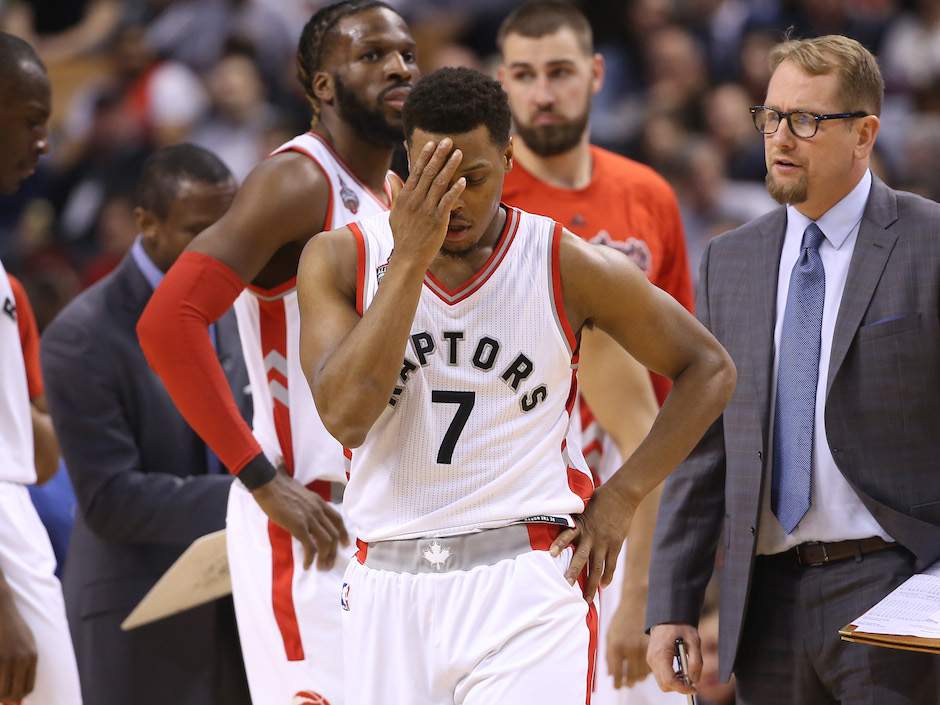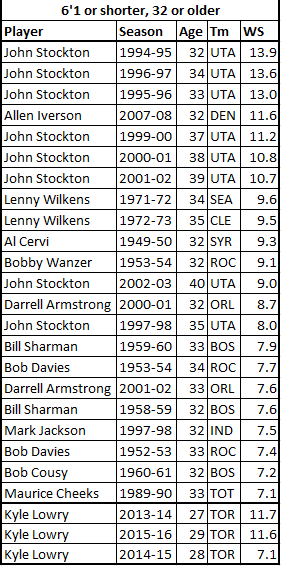I was going to try my best to leave the “Kyle Lowry: Impending Free Agent” stuff alone for the most part this year. At this point, I feel that most know my stance about it, that I’m not worried, that I don’t fault professional athletes for acting out of self-interest and maximizing their earnings over very short careers. And I’d hope, after going through the same process with DeMar DeRozan last season, that most readers know the important details around a superstar free agent scenario – that the collective bargaining agreement is far too restrictive to make an extension possible, that a player doesn’t “owe” a franchise anything, that having to pay substantial raises to important pieces is the cost of becoming, and remaining, very competitive.
Yes, it was absolutely notable when Lowry more or less confirmed to Adrian Wojnarowski of The Vertical this week that he’ll decline his $12-million player option for 2017-18 at the end of this season, barring major injury. It is not, however, all that concerning, at least from a 2016-17 perspective. This won’t be a distraction, Lowry isn’t going to talk about it, and the team seems pretty well-insulated from outside disturbances, if the last few seasons are any indication. Lowry’s opting out, but everyone understands that it’s a formality. C.R.E.A.M.
More than the “yes/no” of opting out, what stood out from Wojnarowski’s piece was the fact that Lowry isn’t talking discount or short-term deal (not that he’d negotiate against himself publicly). Again, none of this should surprise, as Lowry’s been underpaid on his current deal and is about to enter a robust market for what will likely be his last major contract. Lowry wants a five-year deal, and while he loves the Toronto Raptors organization, he wants something done quickly, or he’ll look elsewhere. Totally reasonable.
From the Wojnarowski piece:
Lowry, 30, loves the life he has there, the contending core, the endorsement opportunities, the manic fanbase and the chance to someday raise his No. 7 into the arena rafters. Somewhere on the summer market – Philadelphia, New York, perhaps the Clippers, should they lose Paul – there will be an offer in the neighborhood of a max deal for him. Nevertheless, Lowry’s preference is a painless, fast, five-year deal to stay in Toronto, to take him into his mid-30s with the Raptors.
“If you’re that franchise’s guy, and you’re the guy that they’ve been rolling with, and you’ve given that franchise everything you have, yeah, I think [the talks] should be easy,” Lowry told The Vertical. “I think it should be a situation where a guy shouldn’t have to talk to another team. DeMar didn’t have the chance to talk to another team. …
“For me, I think that at 12:01 a.m. on July 1 – something should be close. If not, I’m open to seeing what else is out there.”
DeRozan took what amounted to roughly a 9.9-percent cut off of his theoretical max, and even if Lowry did the same, the Raptors would be forced to pay substantially. Under the most recent estimates – estimates that are now believed to be somewhat conservative but are confused some by potential impending changes to the CBA – Lowry’s maximum contract from the Raptors would be a five-year, $192.9-million deal. The Raptors hold the hammer in being able to offer larger annual raises and a fifth season, so like with DeRozan, there’s a chance a deal can be struck for something between Lowry’s max with the team and with another franchise (roughly four years and $143.2 million). If Lowry were to take the same marginal haircut that DeRozan did, something in the five-year, $175.3-million area comes out.
That’s a staggering amount of money, even in the new cap economy, and re-signing Lowry near that amount brings risk and complications. Lowry will be 31 next summer, and while he doesn’t have a lot of early-career mileage on him, smaller point guards haven’t historically aged all that well (Lowry is perhaps generously listed at 6-feet) – as a rough gauge (using Win Shares for simplicity), John Stockton (three times) and Allen Iverson (once) are the only players 6-foot-1 or shorter to post a season as good as Lowry’s 2015-16 at the age of 32 or older. Even Lowry’s “down” 2014-15 is a level of excellence that’s been reached by 32-plus, 6-foot-1-and-under players just 22 times in the Basketball Reference database. Lowry has some things going for him, like low total mileage and deep range on a 3-point shot that allows him to spend time at the off-guard, but he also plays a very aggressive and physically demanding style, and his performance has lagged at times late in the season or in the playoffs, owing perhaps to injury or fatigue or variance, or some mix of all three.
So no, signing Lowry to that kind of deal isn’t a slam dunk strictly from a basketball perspective. Doing so would put the Raptors in a position where they’re “locked in” to being very good, with limited flexibility to take the push to championship contender without the good fortune of a major trade or a prospect breaking through to the next level. It doesn’t preclude getting there, but it blocks off free agency as a road, and it gives the Raptors a somewhat narrow window to strike within as DeRozan and Lowry enter the back half of their aging curves together.
If you are of the mind that only a championship matters, and not the path to get there or the years surrounding it, it would be difficult to reconcile the reality of Lowry’s situation with re-signing him. I understand that completely, as someone who’s spent the bulk of my time writing about sports skewing cold and analytic. The same people who feel that way almost surely disagreed with re-upping DeRozan at his price, too. And if you’re of that mentality, you probably thought long and hard about a column entitled “Toronto Raptors Should Look At Trading Kyle Lowry” by friend-of-the-site Justin Rowan.
To be clear, Justin is a friend, has great hair, and is a smart basketball writer. He’s a Cavaliers fan, but it’s hard to blame someone from Winnipeg for any of their life choices (aside from Chris Jericho – The Gift of Jericho is literally the only positive export from Winnipeg; drink it in, man). And Justin reasons around the Lowry situation well, coming to the conclusion that the Raptors ” must assess what they could get in return for him,” and that “it would be irresponsible not to.” In this case, hesitant though I am to put a frown on his handsome face, I disagree pretty strongly with Justin.
Now, the way he’s worded his ultimate call-to-action is pretty hard to argue with. “Assess what they could get in return” is pretty benign, all things considered, especially if the Raptors could manage to navigate such discussions entirely in the shadows. (If Lowry were to find out, this argument is all for naught, because there’s a non-zero chance things would become contentious and render his free agency moot, thereby making Justin’s supposition a self-fulfilling prophecy.) By wording things as he did, Justin’s removed the biggest argument against his broader thesis – that the Raptors would never get anything resembling fair value in return for their superstar, assuming the Raptors would want to remain competitive and not blow the core up completely. There just aren’t enough teams out there with the assets for a win-win Lowry trade that would also a) think Lowry would push them to where they need to go, and b) wouldn’t have the exact same concerns as Toronto about Lowry’s impending free agency.
To take a step back from trade specifics, though, the Raptors just shouldn’t be looking to move on from Lowry, via trade or in free agency, however uncomfortable the numbers may be. Because more than just a championship matters in the larger picture.
By the end of this season, Lowry will cement his place as the best Raptor of all time. Those around him either forced their way out (Damon Stoudamire, Vince Carter), left for justifiable reasons (Chris Bosh, Tracy McGrady), or, a tier down, left on mutual enough terms (Amir Johnson, Jose Calderon). You could quibble between DeRozan and Lowry, given the former’s extended longevity, but Lowry’s peak has been as high as anyone to wear the jersey, he’s been at or near it for several years, and he’s been the team’s avatar, engine, heart, whatever, for the best three-year run in franchise history.
And that matters, and it matters a not-insignificant amount. The Raptors have reshaped their culture and identity entirely around a core led by Lowry, and the absence of Lowry would complicate a lot of that growth. Would a star even want to be traded to Toronto if it meant Lowry was outbound? Would Dwane Casey be able to foster the same king of buy-in without a once-notoriously hard-to-coach player working as an extension of his message and a leader, both by example and by voice? Would fans understand the sterile logic behind moving on from Lowry, without the franchise burning up all of the cache, excitement, and momentum they’ve built over the last three years? What would others on the roster think about what success with the Raptors means for them long-term?
The Raptors have talked a lot about establishing a winning culture, one that players sense immediately when they walk in the doors, with standards understood long before that point. They’ve also talked about turning Toronto into a destination franchise, leveraging Drake, the All-Star Game, the city’s overall momentum, and the recent success of the franchise as major selling points. The Raptors are now a franchise that competes – they’ll make the playoffs for a fourth year in a row for the first time ever this season – and they reward their players and staff for that success. Lowry has been a steward, a spokesman, and a symbol of all the growth that the franchise has undergone since Masai Ujiri took the reigns and accidentally held on to him.
Those things, while impossible to quantify, absolutely matter. I had a great chat with Jared Sullinger the other day about how coming to Toronto was a no-brainer for him, and he cited a lot of these reasons. Raptors fans always ask about signing Veteran X late in the year, or adding Veteran Y at the minimum like Golden State, San Antonio, and Cleveland can, and you need to offer more than just a roster spot to land those types of fish. Looking longer-term, the Raptors probably don’t want to be the franchise that everyone walked away from, only to alienate the stars who wanted to stay (I can’t imagine DeRozan would take a Lowry departure particularly well). They want to be a franchise that creates stars, with stars who measure the franchise and find it to be a suitable home.
On top of all of that, the path to legitimate contention, if that’s all that matters, isn’t any cleaner without Lowry. He’s the team’s best player, full stop, and nearly any move would be considered a step back to later try to take two forward. (I’d argue that there’s almost no potential Lowry leaving scenario in which it wouldn’t also necessitate moving DeRozan for the logic to hold). That road is long and paved with What Ifs and different risks than Lowry presents, whereas the Raptors with Lowry at least know they’re a second-tier team, a fortuitous break, trade, or development away.
I want a championship in Toronto eventually, too. I’m not willing to set the franchise back Ujiri’s entire tenure and make the road back to competing even harder in the process, all for an eventually-marginally-maybe-slightly-better long-term chance at getting there. Kyle Lowry Over Everything, including my normally cold black analytic heart.




